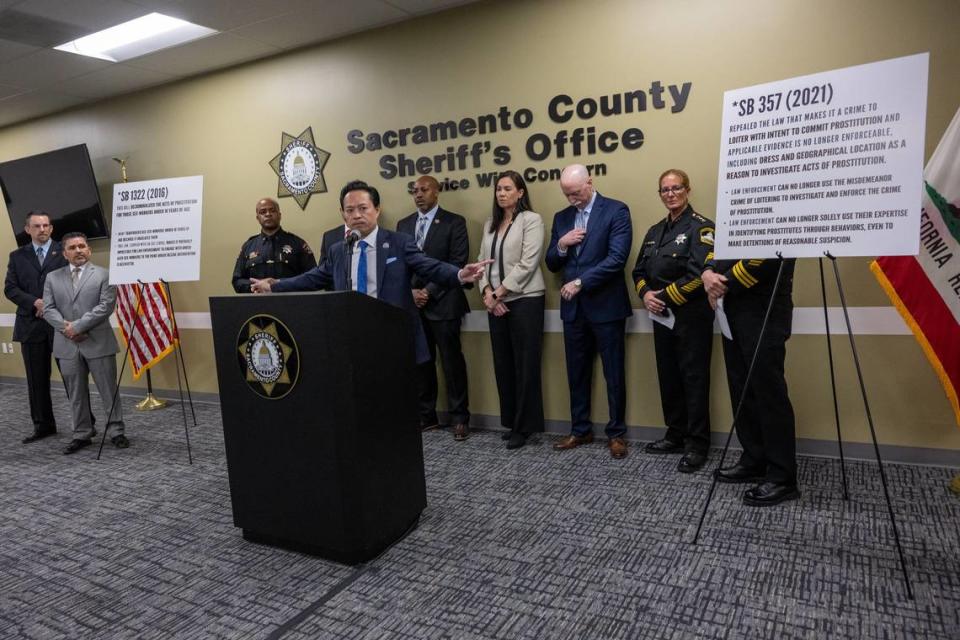3 arrested, nearly 100 cited in Sacramento sheriff’s operation on child sex trafficking
Authorities arrested three people on suspicion of felony sex trafficking, issued nearly 100 citations and helped rescue three teenagers during a recent operation targeting child prostitution and sex trafficking in Sacramento County, Sheriff Jim Cooper announced Friday.
At least two of the three alleged traffickers had prior trafficking convictions, Cooper said during a news conference at the Sheriff’s Office headquarters in Old Foothill Farms. Sixty-five sex workers and 31 sex buyers were given misdemeanor citations, he said.
The Sheriff’s Office said 102 people were arrested or cited in total. Five arrests during the operation were related to vehicle theft, firearm possession and sale of cocaine, the sheriff said.
The three rescued juveniles were girls age 16, 15 and 13. The 16-year-old was reunited with family in Roseville after having been trafficked in the Sacramento area, Bay Area and Southern California, Cooper said.
The operation was conducted for seven days over the span of three weeks and focused on problem areas in the county, including the shopping centers near Florin Road and Stockton Boulevard.
The arrests and citations also led to the opening of investigations into three suspected trafficking organizations, Cooper said, which will be investigated with assistance from state and federal law enforcement officials, including the FBI.
“Human trafficking is a very significant problem in Sacramento County and the metro region,” said Sean Ragan, the special agent in charge for the FBI’s Sacramento field office. “But Sacramento County is not unique. ... Human trafficking is a global threat and a global problem.”
Sacramento County District Attorney Thien Ho said his office was working to form a new human trafficking task force, “to try to go after these traffickers and go after the buyers as well.”
Sheriff, DA blast California law changes
Cooper, a Democrat who served in California’s Assembly for eight years after 30 years with the Sacramento County Sheriff’s Office before being elected sheriff in 2022, condemned laws passed by the state in recent years that he said make it more difficult for law enforcement to make human trafficking arrests.
Senate Bill 1322, passed in 2016 and signed into law by former Gov. Jerry Brown, decriminalized prostitution for minors. Senate Bill 357, passed in 2021 and signed by Gov. Gavin Newsom last year, decriminalized loitering with the intent of engaging in prostitution, formerly a misdemeanor.
Proponents of SB 1322 argue that young sex workers should be treated as victims rather than criminals. Supporters of SB 357 say it is intended to reduce discriminatory profiling; its author, Sen. Scott Wiener, D-San Francisco, said in a statement that “many of those impacted by this law are Black and Brown trans women.”

But Cooper said Friday that in practice, the laws make it more difficult to arrest human traffickers and to rescue juvenile victims.
“It is hard as hell to get those traffickers, because they insulate themselves (using juveniles),” he said. “These are very bad actors, repeat offenders. They don’t care.”
Another law, Senate Bill 203, barred law enforcement from interrogating or questioning all minors without ensuring the minor is first provided consultation with legal counsel. Previous law made that a requirement for juveniles ages 15 and younger, but SB 203, signed into law in 2020, expanded the requirement to all minors.
Cooper said SB 203 also adds to the difficulty of pursuing traffickers, often leaving it in the hands of federal law enforcement officials in instances that involve interstate trafficking.
“For some folks, it’s like, ‘Hey, they’re victims. We’re not gonna do anything. Hands off, they’re victims.’ Yeah, they’re victims, I agree,” Cooper said. “But if we want to get those traffickers, those pimps, it’s through the girls. That’s the bottom line.”
Ho said the laws “need to change.”
California Senate Republicans tried last month to repeal SB 357 but were unsuccessful.

